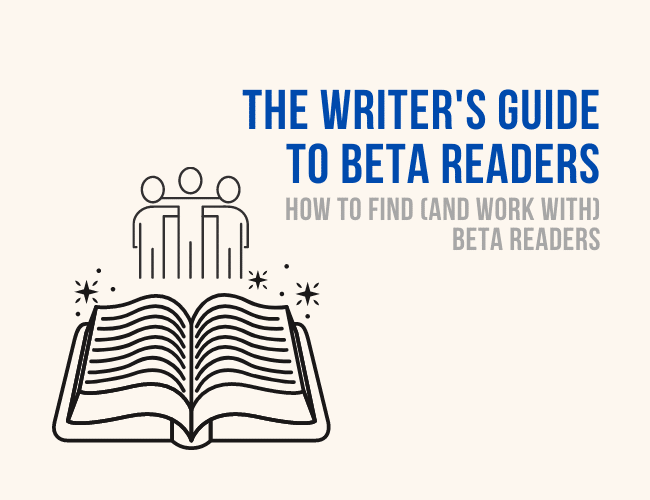If you don't know what a beta reader is, jump back to the previous post in this series to find out! The previous post also gave the answers to burning questions about whether you pay beta readers, the type of beta readers you want to find, and more.
Now we'll move on to how to find beta readers and, possibly more important, how to work with beta readers.

There will be one more post in this series on beta readers. Stay tuned!
How to Find Beta Readers
In my previous beta reader post, I went over the types of people you'd want to beta for you. In short, they need to be reliable, honest, and read your genre. Now that you know who to ask, the question is where to find those people.
Where to Find Beta Readers
It might seem like a monumental task to find a group of people willing to volunteer to read your manuscript and give you good feedback. Luckily, it's actually not. Most people are more than willing to give you a little help. You can find beta readers just about anywhere. Here's a list to get you started:
Writing communities are probably the best places to look for beta readers. The people in these groups are writers (duh!) and will totally get what you're needing from them. They'll also be more likely to know what they're talking about when it comes to recognizing plot holes and characterization problems. They also might be finishing up a manuscript of their own and looking for their own beta readers. This swapping of stories is what writing communities are all about!
Don't have a writing community? We'd love for you to join ours, The Write Practice Pro.
Local writing groups are another great place to shop for betas, for the same reasons as above.
Your mailing list is another go-to spot to pick up some beta readers. If you don't have an author site yet, you need to get one! Asking people on your site's mailing list is great because they're already interested in your work enough to subscribe (also known as being a member of your target audience), so why wouldn't they want to beta for you?
Keep in mind here that you don't want to give your book away to ALL your subscribers. Otherwise, who will you sell it to when it's released? Choose a couple and move on.
Don't have an author website yet? Here's how to build yours.
Acquaintances are a great way to go. These people know you, but don't know you well enough to not give you honest feedback. (Friends and family love you too much to give you an honest opinion.) You can ask some folks at work or put out a request for help on social media.
Remember, when searching for beta readers, you need to make sure you're collecting honest readers. People who've only read one book since high school are not going to be helpful.
How to Ask People to Beta Read for You
Now that you know where to look, how do you go about asking?
It's tough to ask for help, especially for introverted writers. It's especially tough to ask for free help.
The great thing is, as I mentioned earlier, most people are more than willing to give you a hand. Everyone I've ever asked has jumped at the opportunity. I've had strangers on the internet, other writers, and random people from my husband's work (whom I've never met) agree to beta read for me.
It's really astounding how excited people are to beta read. They're normally honored to be asked and curious what it's like to be inside the process of writing and publishing a book. So ask away!
A tip for asking on social media: Start your post with actually asking for a favor. Don't write a really long post explaining everything about your book. Don't act like it's a huge imposition on people. Don't act like your book is “probably just okay” and be apologetic. Just ask! Here's a sample post:
Hey, can I ask you to do me a favor? I'm looking for beta readers for my latest book and would love it if you could help me out! PM or email me at randomemail@random.com if you're interested!
That's it! Easy as pie. (And way easier than writing a book!)
5 Steps to Work With Beta Readers
Now that you have a group of beta readers ready and waiting for your book, what's the next step? What should you do with these eager readers?
Here's how to give your beta readers the best experience and ensure you get the most useful feedback.
1. Prepare Your Manuscript
Edit. Your manuscript shouldn't be full of crazy typos and notes you've made to yourself. It should be as clean as possible.
You don't want your betas to have to slog through nonsense to do you this favor. Fix as much as you can possibly fix before you send it to betas.
2. Specify What You Want
Beta readers need direction. There's a good chance a lot of your dream team hasn't beta read anything before. They're most likely not one hundred percent sure what they should be doing.
Remember beta readers are not professional editors. They're not looking for typos. (They'll most likely point them out when they catch them, but that's not their primary purpose.)
Beta readers are there as a test reader market for your book. They're to read as a reader would. You know how you read a horrible/fantastic book and then talk about the issues/great writing with everyone who'll listen? That's basically what you want your betas to do.
You want their honest opinion as a reader. But you also want to keep them focused on their job. Therefore, you need a list of questions you're concerned about.
I like to encourage betas to give general comments at the end, but also give them a few questions to focus on. With my last book, I wanted to know a few key things:
- Did my main character make choices?
- Was the ending satisfactory?
- Was my secondary character redeemable?
- Did my world rules make sense?
Don't overwhelm betas with pages and pages of questions, but do give them some focus. This is supposed to be enjoyable for them, not seem like homework. If they don't fill out every question, that's fine!
3. Send the Manuscript to Your Betas
Your beta readers might have a preferred way to receive your manuscript (some may want a hard copy, for instance) and that's fine if you want to ask them how they want to read it. Some advice, though: if you only have two or three betas, allowing them each to choose might be reasonable. If you have thirty-something like I did, it's not reasonable.
In my opinion, the digital route is the only way to go with beta readers. It's easiest for everyone and you don't have to try to read someone's scrawling handwriting.
Google Docs and MS Word are my top choices. It's easy to add comments in both these programs and most people have access to them. Remember, you need to make it as easy as possible for your beta readers.
I used Google Docs last time. Everyone got their own Doc with their name added to the title. I only allowed commenting (VERY IMPORTANT) and not editing in the share settings. You don't want your beta readers editing your manuscript directly! You'll never figure out what they changed and it's harder to compare versions.
When everyone was finished, I combined the Docs into one MS Word file so I could see everyone's comments at once.
There are also software programs specifically designed for helping authors share their manuscripts with beta readers and get feedback in the most useful, least headache-inducing way. One such program is BetaBooks. If you're looking for a tech solution created with beta reading in mind, you might find it worth trying.
If not, Google Docs and MS Word work just fine.
4. Give Deadlines
This one is crazy important. If you do not give your betas a deadline, you will never get them to finish your book. (Well, a couple might.) You'll be waiting around forever for that feedback and you'll get frustrated with them. More importantly, your book release will be delayed!
I recommend a relatively short deadline of maybe a few weeks. I gave mine three for my last novel. If you give them several months, they're likely to forget. If you give them a couple days, they're not going to do it because that's crazy. The average person can finish a book in three weeks.
Make sure they know the deadline, but also tell them it's perfectly fine if they don't get to all of your book by then. Regardless of whether they finish, you're moving on to the next stage after that deadline hits! (DO NOT use beta readers as an excuse to let your work languish.)
5. Be Understanding
Things come up. If your beta readers aren't able to finish your book within your deadline, never attack them for it. Don't hold a grudge. Don't yell at them. Don't even remind them of their commitment.
Remember, they were doing you a favor to begin with. Be understanding and respectful of their time and their lives.
It's a Favor
The biggest thing to remember about this entire beta reading process is that your beta readers are doing you a favor. Make it as easy as possible for them every step of the way!
Want to learn more about beta readers? Check out my previous post.
In my next post I'll talk about what to do with all that great feedback you're going to get from your beta readers!
Who would you ask to beta read for you? Any other ideas of where to find beta readers? Let me know in the comments.
PRACTICE
Write for fifteen minutes on this prompt:
Someone posts the weirdest request for a favor you've ever seen on social media. What is it and will you do it?
When you're, post your work in the comments, and be sure to provide feedback for your fellow writers!
Sarah Gribble is the author of dozens of short stories that explore uncomfortable situations, basic fears, and the general awe and fascination of the unknown. She just released Surviving Death, her first novel, and is currently working on her next book.
Follow her on Instagram or join her email list for free scares.




0 Comments